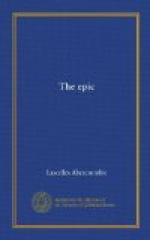This is not to examine the development of epic poetry by looking at that which is not poetry. In this kind of art, more perhaps than in any other, we must ignore the wilful theories of those who would set boundaries to the meaning of the word poetry. In such a poem as Milton’s, whatever is in it is its poetry; the poetry of Paradise Lost is just—Paradise Lost! Its pomp of divine syllables and glorious images is no more the poetry of Milton than the idea of man which he expressed. But the general manner of an art is for ever similar; it is its inspiration that is for ever changing. We need never expect words and metre to do more than they do here:
they,
fondly thinking to allay
Their appetite with gust, instead of fruit
Chewed bitter ashes, which the offended
taste
With spattering noise rejected: oft
they assayed,
Hunger and thirst constraining; drugged
as oft,
With hatefullest disrelish writhed their
jaws,
With soot and cinders filled;
or more than they do here:
What though the field be lost?
All is not lost; the unconquerable will,
And study of revenge, immortal hate,
And courage never to submit or yield,
And what is else not to be overcome.
But what Homer’s words, and perhaps what Virgil’s words, set out to do, they do just as marvellously. There is no sure way of comparison here. How words do their work in poetry, and how we appreciate the way they do it—this seems to involve the obscurest processes of the mind: analysis can but fumble at it. But we can compare inspiration—the nature of the inmost urgent motive of poetry. And it is not irrelevant to add (it seems to me mere fact), that Milton had the greatest motive that has ever ruled a poet.




